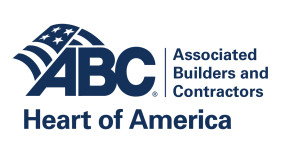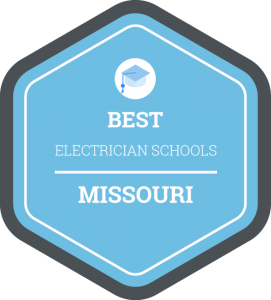If you want to become an electrician, there are several educational paths you can pursue.
Programs that lead to certificates or diplomas can be completed in less than one year and get you ready for entry-level employment.
An associate in Applied Science Degree can be earned after two years of post-secondary education.
Apprenticeships that last up to five years and combine classroom training with paid on-the-job training are also an option.
To help you choose the format that works best for you, on this page we have compiled information about some of the best electrician schools in Missouri.
1American Trade School

About the School
The American Trade School offers industry-specific training programs that prepare students for careers in the fields of Heating, Ventilation, Air Conditioning, and Electrical.
Students who enroll at the school for regular programs must be at least 17 and a half years old.
They also need a valid high school diploma or a high school equivalency certificate.
Financial aid is available for students who qualify.
Courses Offered
There are two educational paths available at American Trade School:
- HVAC Training
- Electrical Training
The Electrical Training program teaches students about residential, commercial, and industrial wiring and prepares them for employment as electrical apprentices.
The hands-on programs prepare students with the theory and skills needed for employment in the field of electrical installation, maintenance, and repair.
The Electrical Training curriculum covers topics such as:
- Residential Wiring Methods
- Residential Modernization
- Commercial Wiring Methods
- Commercial Motor Applications
- Residential New Construction
- And more
The program can be completed in 14 months and are available in day and night classes.
Classes meet Monday through Thursday.
Contact Information
- Address: 3925 Industrial Drive, Saint Ann, MO 63074
- Phone: 314-423-1900
- Website: https://www.americantradeschool.edu
2Electrical Connection

About the School
Electrical Connection is a partnership between the International Brotherhood of Electrical Workers Local One and the St. Louis Chapter of the National Electrical Contractors Association.
Founded in 1891, IBEW Local One created the first-ever apprenticeship training program for the electrical industry in 1941.
Since then, it has trained more than 10,000 electricians.
Courses Offered
The IBEW/NECA Electrical Industry Training Center provides a five-year, 10,000-hour training program that consists of:
- A 78-course curriculum
- A mentoring program that pairs the apprentice with skilled electricians or communication technicians
Effective outreach ensures that the programs are available to all those who want to start a career in the electrical/communications industry.
Continuing education programs are also available, free of charge for workers who want to keep up with their training.
The center partners with colleges in the area to help students who want to earn an associate degree.
Contact Information
- Address: 5735 Elizabeth Ave. St. Louis, MO 63110
- Phone: (314) 781-0755
- Website: https://electricalconnection.org
3Hillyard Technical Center

About the School
Hillyard Technical Center aims to prepare its students for workforce success and continuous learning.
The center provides training programs in a variety of industries: from automotive service to fire science.
Courses Offered
The center’s catalog also includes an Electronics Technology pathway.
This program prepares students with skills in basic electricity, network theorems, motor controls, digital logic, digital electronics, integrated circuits, robotics, semiconductors, AC fundamentals, and a variety of other topics related to the Electricity field.
The program can be completed in two years by high school students.
To qualify for admission, students must apply through their high school counselor.
It is preferred that students have a grade of C or better in Algebra and can read at the 10th-grade level.
A registered youth apprenticeship program is also available and combines technical instruction with on-the-job training.
Apprenticeships are available for the following occupations: IT Generalist, Welder, CNC Operator, Industrial Maintenance Mechanic, Auto Technician, Auto Body Repairer, and Electronic Technician.
Contact Information
- Address: 3434 Faraon Street, St. Joseph, MO 64506
- Phone: 816-671-4170
- Website: https://hillyardtech.sjsd.k12.mo.us
4Grand River Technical School

About the School
Grand River Technical School provides technical training programs for secondary and post-secondary students.
The campus consists of classrooms and shops for each program.
On-site preschool and child care are also available for those who need child care for their children while they attend school.
Grand River Technical School is accredited by the Commission of the Council on Occupational Education.
Courses Offered
Grand River Technical School provides an Automation and Electrical Technology program.
It is open to post-high school students only.
The program includes 1,080 hours of instruction and can be completed in nine months by students who attend school six and a half hours per day.
The courses are designed to prepare students for employment in schools, hospitals, manufacturing facilities, building complexes, and the field of residential, commercial, and industrial construction.
The curriculum covers the following training areas:
- Industry Safety
- Basic AC and DC Electrical Theory
- Wiring Basic AC and DC Circuits
- Programmable Logic Controllers
- Troubleshooting Electrical Systems
- Basic Robotics
- And more
Contact Information
- Address: 1200 Fair St, Chillicothe, MO 64601
- Phone: 660-646-3414
- Website: https://www.grts.org
5State Technical College of Missouri

About the School
State Technical College of Missouri offers hands-on education for students who want to start rewarding careers in a variety of in-demand industries.
State Tech’s campus is home to more than 50 labs, an airport, a golf course, a utility field, and more than 40 acres of land dedicated to heavy equipment operations programs.
Tuition for in-state students is $196 per credit hour.
Courses Offered
The State Technical College of Missouri catalog includes an Electrical Technology program.
This pathway consists of an up-to-date curriculum designed to prepare students for work in residential, commercial, or industrial settings.
Among many other topics, students take classes such as:
- Codes and Standards
- Blueprint Reading and Project Development
- Circuitry Fundamentals with Lab
- Industrial Motor Controls
- Power Distribution
- Motors and Generators
- Alternative Energy Systems
The core Electrical Technology curriculum includes 52 credits in total.
General education courses add up to 19 credits.
Students also take a one-credit course in Job Search Strategies.
In total, the program includes 72 credits.
Students can earn an Electromechanical Certificate after acquiring 33 credits of selected courses.
Contact Information
- Address: One Technology Drive, Linn, MO 65051
- Phone: (573) 897-5000
- Website: https://www.statetechmo.edu
6Lex La-Ray Technical Center
About the School
Lex La-Ray Technical Center provides training programs in a variety of industries.
The center opened in 1975 and serves around 300 students per year.
It is one of 57 area vocational-technical schools in Missouri.
Lex La-Ray Technical Center is accredited by the Missouri Department of Elementary and Secondary Education and the Council on Occupational Education.
Courses Offered
Lex La-Ray Technical Center provides a Building Trades program that covers rough framing, finishing, painting, ceramic tile, plumbing, electrical wiring, and a variety of other skills needed in building trades.
To qualify for admission, students must meet the following requirements:
- Be 18 years of age by the class start date
- Provide high school graduation transcript or 12th grade GED Certificate
- Have transcripts from other post-secondary institutions the student has attended
- Provide documentation that they are current on all state-required immunizations
- Complete and Entrance Interview with Adult Education Supervisor
- Provide a copy of your Social Security Card
To graduate, students must complete the Lex La-Ray Center program with at least a 2.0 GPA average.
Attendance of at least 95 percent of days available is also required.
The Building Trades and Cabinet Making full-time program costs $6,933.
Contact Information
- Address: 2323 High School Dr, Lexington, MO 64067
- Phone: 660-259-2264 Ext. 6004
- Website: https://www.lexlaray.com
7Ozarks Technical Community College

About the School
Ozarks Technical Community College provides affordable educational opportunities.
More than 40 different degree programs are available at the college.
Courses Offered
The college’s catalog includes a wide variety of programs, including:
- Electrical Distribution Systems Associate in Applied Science Degree
- Electrical Technician- A.A.S. Degree
- Electronic Media Production Degree
The curriculum varies depending on the program.
The Electrical Distribution Systems pathway includes classes in:
- Introduction to Electrical Distribution
- Safety and Prevention Methods
- Transformer Theory
- Service Installation and Metering
- Gloving and Live Line Procedure
- Underground Power Distribution
- And more
Students need 41 credits in program-required courses and 21 credits in pre-admission recommendation courses.
The Electrician Technician degree requires 41 credit hours in program-required courses and 22 credit hours in general education classes.
In-district tuition at Ozarks Technical Community College is $122 per credit hour for tier I, $125 for tier II, and $136 for tier III programs.
Contact Information
- Address: 1001 E. Chestnut Expressway, Springfield, MO 65802
- Phone: (417) 447-7500
- Website: https://www.otc.edu
8Associated Builders and Contractors

About the School
Associated Builders and Contractors offers apprenticeship programs for electricians, plumbers, pipefitters, carpenters, and construction laborers.
Apprentices can get hands-on training at the association’s facilities in Kansas and Fenton.
The center has two campuses: Kansas City and Fenton.
Courses Offered
The Electrical Apprenticeship provided by Associated Builders and Contractors lasts four years and covers the basics of wiring and troubleshooting, electrical equipment, but also blueprints for residential, commercial, and industrial wire systems.
Students learn a variety of skills, including:
- Design, wiring, and troubleshooting of advanced electrical components
- Use of logical thinking and math to interpret blueprints, program equipment, and layout design
- Utilize alternative energy systems and other innovative advances
To qualify for admission, applicants must:
- Be at least 18 years of age
- Provide a copy of their high school diploma or GED
- Provide a copy of their driver’s license
Continuing Education programs are also available to help licensed workers stay up to date with the latest advancements in the field.
Contact Information
- Address: 4035 Denton Road Kansas City MO 64133
- Phone: 816.994.5990
- Website: https://www.abcksmo.org
9Independent Electrical Contractors

About the School
The Independent Electrical Contractors is a trade association representing more than 3,300 members in its 50 nationwide chapters.
The association provides apprenticeships and training programs that help students learn the skills needed for employment and keep up with their training.
Courses Offered
The four-year Electrical apprenticeship allows students to earn a wage while learning the skills needed for this profession.
The program costs $1,200 per semester.
Students spend approximately $700 per year on books.
Graduates are registered as journeyman electricians by The Independent Electrical Contractors and the Office of Apprenticeship.
To qualify for admission, applicants must:
- Be 18 years of age
- Complete an application online
- Provide a high school transcript or GED
- Have reliable transportation
- Consent on taking a drug test
- After completing the application process, the IEC staff help students find employment with an IEC Electrical Contractor member.
Contact Information
- Address: 668 Goddard Ave. Chesterfield, MO 63005
- Phone: (636) 536-9701
- Website: https://www.iecstl.com
10Columbia Area Career Center
About the School
Columbia Area Career Center offers high school career and technical education.
The center provides multiple dual credit courses that allow students to earn high school and college credits.
The cost for dual credit ranges from $70-$105 per credit hour, depending on the partner institution’s tuition rate.
Scholarships are available for students who qualify.
Courses Offered
The center’s catalog includes an Industrial & Engineering Technology pathway with programs such as:
- Construction and Contracting
- Digital Electronics
- Engineering Design and Development
- Introduction to Engineering Design
- And more
The Digital Electronics pathway is available for students in grades 10, 11, and 12.
The curriculum provides classes such as:
- Digital Electronics
- Pre-calculus College Algebra Statistics
- Principles of Engineering
- Engineering Design and Development
- And more
Students learn how to design physical circuits and microcontrollers used in a variety of settings.
In labs, students learn how to implement academic concepts in real-world situations.
Through participation in SkillsUSA, trainees also have the opportunity to advance personal and professional skills.
A C grade or better in Algebra I or credit in Introduction to Engineering Design or Principles of Engineering is recommended.
Contact Information
- Address: 4203 S. Providence Rd., Columbia, MO 65203
- Phone: 573-214-3800
- Website: https://career-center.org
Regional Salary in Missouri
| Region | Employed | Avg. Annual Salary | Avg. Hourly Pay | Top 10% Annual Salary | Bottom 10% Annual Salary |
|---|---|---|---|---|---|
| Cape Girardeau, MO-IL | 130 | $57,110 | $27.46 | $80,800 | $36,100 |
| Columbia, MO | 280 | $60,090 | $28.89 | $92,200 | $36,370 |
| Jefferson City, MO | 400 | $65,630 | $31.55 | $90,230 | $37,290 |
| Joplin, MO | 340 | $64,730 | $31.12 | $91,270 | $37,550 |
| Kansas City, MO-KS | 5,090 | $69,020 | $33.18 | $98,200 | $38,450 |
| St. Joseph, MO-KS | 420 | $70,820 | $34.05 | $94,740 | $38,280 |
| St. Louis, MO-IL | 6,110 | $74,740 | $35.93 | $99,350 | $38,310 |
| Springfield, MO | 960 | $56,400 | $27.11 | $80,100 | $34,530 |
* Employment conditions in your area may vary.
Final Thoughts
Missouri is home to several reputable institutions that can get you ready for entry-level employment in the electrician trade in two years or less.
Apprenticeships that prepare you for the journey worker exam through a combination of on-the-job training and classroom instruction are also available.
Now that you have read our list, it’s time to continue the research and decide what type of program is best for you.






